Article Matrix: Parenting Styles Impact on Adolescent Relationships
VerifiedAdded on 2022/09/12
|6
|1179
|29
Homework Assignment
AI Summary
This article matrix, completed for a Developmental Psychology assignment, analyzes three research articles exploring the influence of parenting styles on relationship development from adolescence to adulthood. The first article, by van Ingen et al. (2015), investigates the effects of overbearing parenting on peer attachment and self-efficacy. The second article, by Kumar and Mattanah (2016), examines the relationship between attachment parenting styles and psychosocial adjustment in emerging adulthood. The third article, by Waldinger and Schulz (2016), explores the connection between nurturing family environments and late-life security in intimate relationships. Each article is summarized, and key findings regarding the impact of parenting styles on various aspects of relationship building and maintenance are highlighted, including peer relationships, romantic competence, emotional regulation, and attachment security. The assignment demonstrates an understanding of the research methodologies, findings, and limitations of each study, contributing to a broader understanding of developmental psychology.
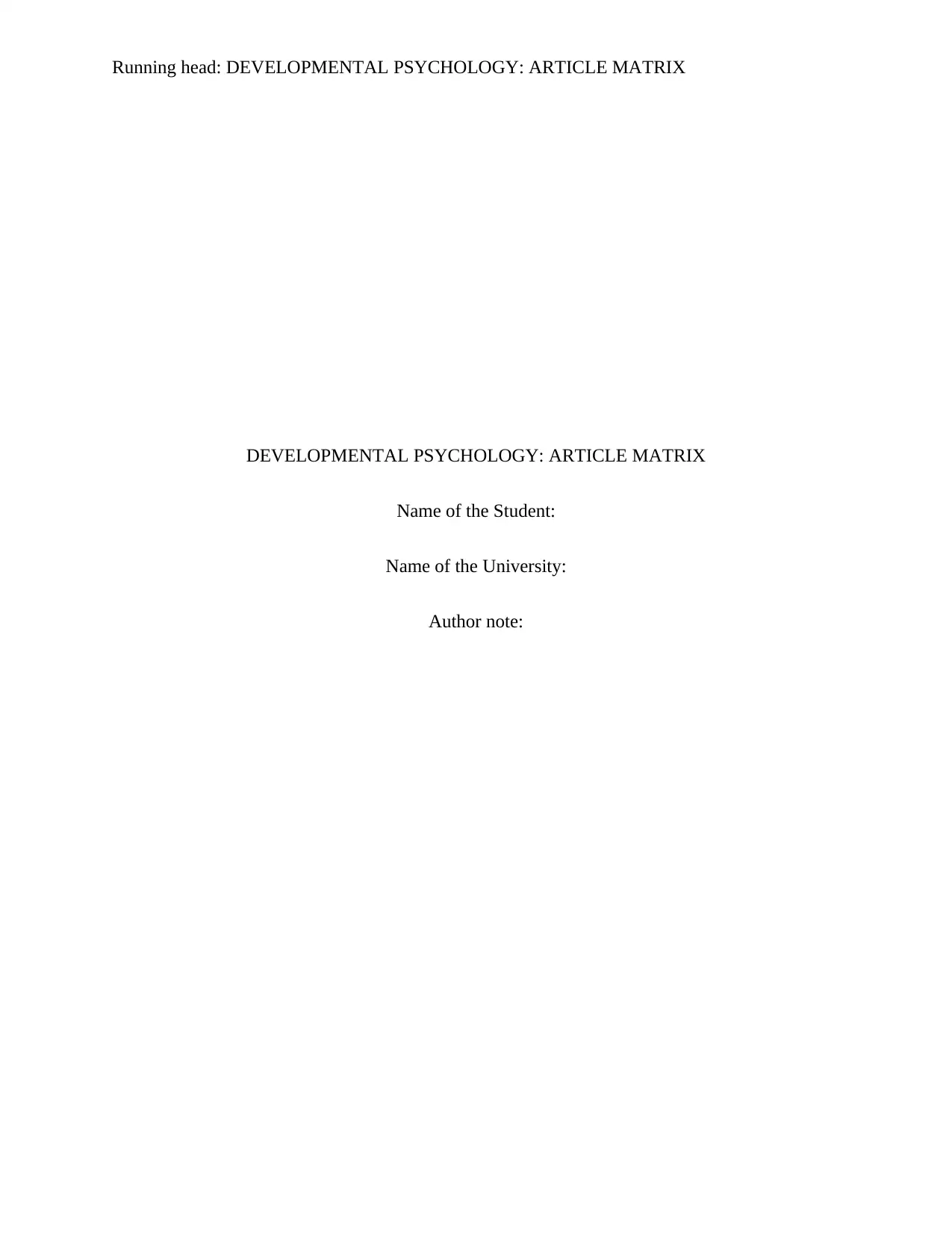
Running head: DEVELOPMENTAL PSYCHOLOGY: ARTICLE MATRIX
DEVELOPMENTAL PSYCHOLOGY: ARTICLE MATRIX
Name of the Student:
Name of the University:
Author note:
DEVELOPMENTAL PSYCHOLOGY: ARTICLE MATRIX
Name of the Student:
Name of the University:
Author note:
Paraphrase This Document
Need a fresh take? Get an instant paraphrase of this document with our AI Paraphraser
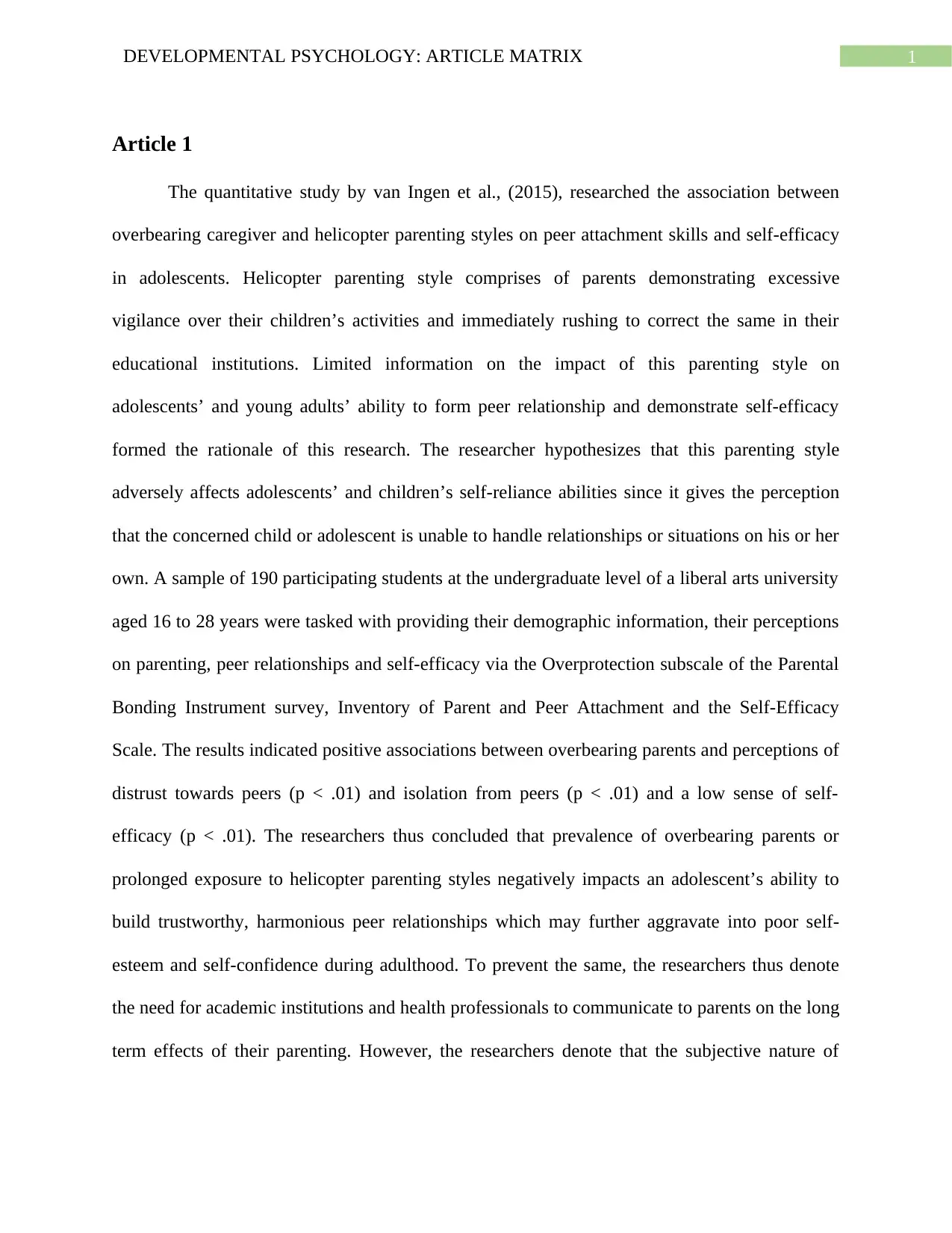
1DEVELOPMENTAL PSYCHOLOGY: ARTICLE MATRIX
Article 1
The quantitative study by van Ingen et al., (2015), researched the association between
overbearing caregiver and helicopter parenting styles on peer attachment skills and self-efficacy
in adolescents. Helicopter parenting style comprises of parents demonstrating excessive
vigilance over their children’s activities and immediately rushing to correct the same in their
educational institutions. Limited information on the impact of this parenting style on
adolescents’ and young adults’ ability to form peer relationship and demonstrate self-efficacy
formed the rationale of this research. The researcher hypothesizes that this parenting style
adversely affects adolescents’ and children’s self-reliance abilities since it gives the perception
that the concerned child or adolescent is unable to handle relationships or situations on his or her
own. A sample of 190 participating students at the undergraduate level of a liberal arts university
aged 16 to 28 years were tasked with providing their demographic information, their perceptions
on parenting, peer relationships and self-efficacy via the Overprotection subscale of the Parental
Bonding Instrument survey, Inventory of Parent and Peer Attachment and the Self-Efficacy
Scale. The results indicated positive associations between overbearing parents and perceptions of
distrust towards peers (p < .01) and isolation from peers (p < .01) and a low sense of self-
efficacy (p < .01). The researchers thus concluded that prevalence of overbearing parents or
prolonged exposure to helicopter parenting styles negatively impacts an adolescent’s ability to
build trustworthy, harmonious peer relationships which may further aggravate into poor self-
esteem and self-confidence during adulthood. To prevent the same, the researchers thus denote
the need for academic institutions and health professionals to communicate to parents on the long
term effects of their parenting. However, the researchers denote that the subjective nature of
Article 1
The quantitative study by van Ingen et al., (2015), researched the association between
overbearing caregiver and helicopter parenting styles on peer attachment skills and self-efficacy
in adolescents. Helicopter parenting style comprises of parents demonstrating excessive
vigilance over their children’s activities and immediately rushing to correct the same in their
educational institutions. Limited information on the impact of this parenting style on
adolescents’ and young adults’ ability to form peer relationship and demonstrate self-efficacy
formed the rationale of this research. The researcher hypothesizes that this parenting style
adversely affects adolescents’ and children’s self-reliance abilities since it gives the perception
that the concerned child or adolescent is unable to handle relationships or situations on his or her
own. A sample of 190 participating students at the undergraduate level of a liberal arts university
aged 16 to 28 years were tasked with providing their demographic information, their perceptions
on parenting, peer relationships and self-efficacy via the Overprotection subscale of the Parental
Bonding Instrument survey, Inventory of Parent and Peer Attachment and the Self-Efficacy
Scale. The results indicated positive associations between overbearing parents and perceptions of
distrust towards peers (p < .01) and isolation from peers (p < .01) and a low sense of self-
efficacy (p < .01). The researchers thus concluded that prevalence of overbearing parents or
prolonged exposure to helicopter parenting styles negatively impacts an adolescent’s ability to
build trustworthy, harmonious peer relationships which may further aggravate into poor self-
esteem and self-confidence during adulthood. To prevent the same, the researchers thus denote
the need for academic institutions and health professionals to communicate to parents on the long
term effects of their parenting. However, the researchers denote that the subjective nature of
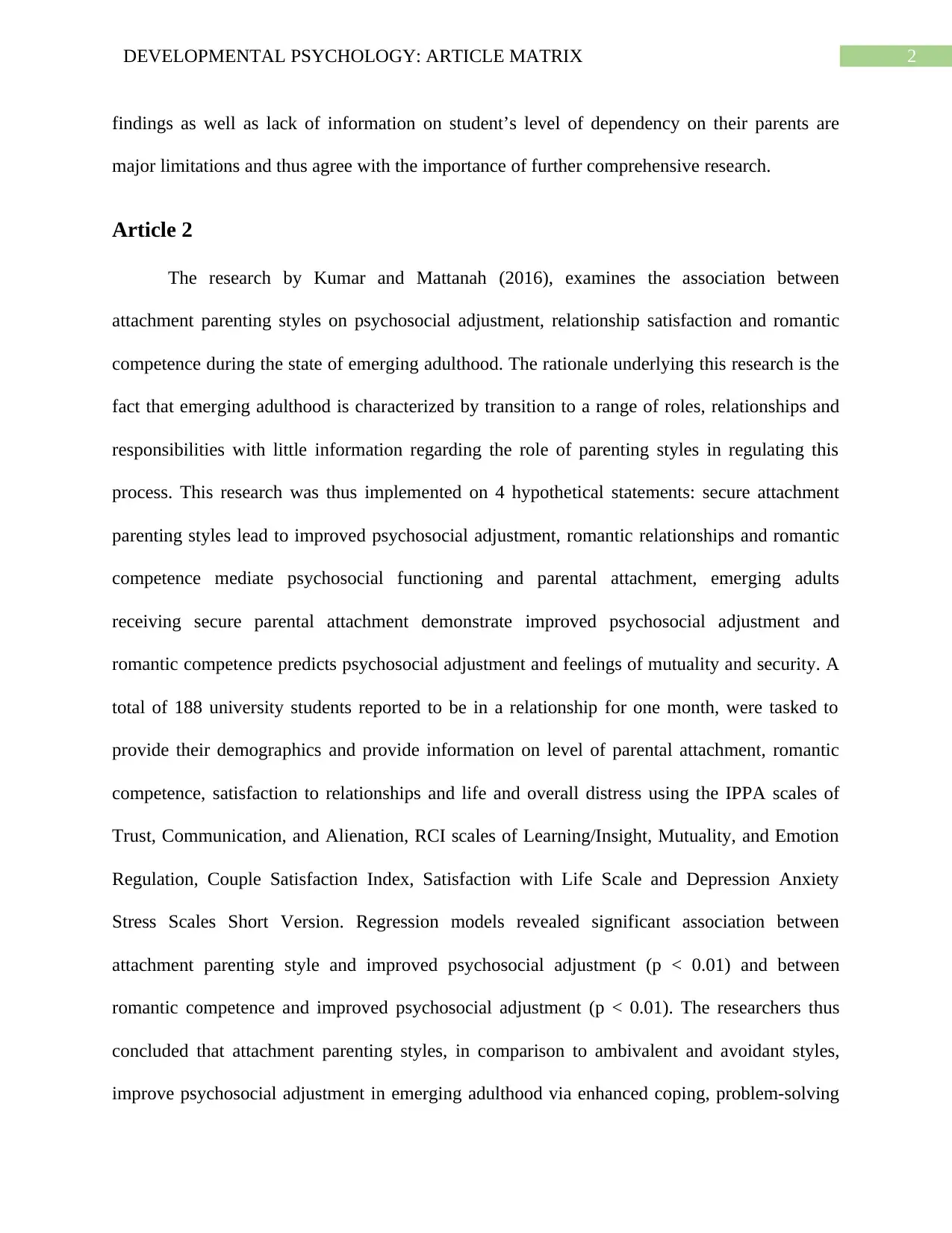
2DEVELOPMENTAL PSYCHOLOGY: ARTICLE MATRIX
findings as well as lack of information on student’s level of dependency on their parents are
major limitations and thus agree with the importance of further comprehensive research.
Article 2
The research by Kumar and Mattanah (2016), examines the association between
attachment parenting styles on psychosocial adjustment, relationship satisfaction and romantic
competence during the state of emerging adulthood. The rationale underlying this research is the
fact that emerging adulthood is characterized by transition to a range of roles, relationships and
responsibilities with little information regarding the role of parenting styles in regulating this
process. This research was thus implemented on 4 hypothetical statements: secure attachment
parenting styles lead to improved psychosocial adjustment, romantic relationships and romantic
competence mediate psychosocial functioning and parental attachment, emerging adults
receiving secure parental attachment demonstrate improved psychosocial adjustment and
romantic competence predicts psychosocial adjustment and feelings of mutuality and security. A
total of 188 university students reported to be in a relationship for one month, were tasked to
provide their demographics and provide information on level of parental attachment, romantic
competence, satisfaction to relationships and life and overall distress using the IPPA scales of
Trust, Communication, and Alienation, RCI scales of Learning/Insight, Mutuality, and Emotion
Regulation, Couple Satisfaction Index, Satisfaction with Life Scale and Depression Anxiety
Stress Scales Short Version. Regression models revealed significant association between
attachment parenting style and improved psychosocial adjustment (p < 0.01) and between
romantic competence and improved psychosocial adjustment (p < 0.01). The researchers thus
concluded that attachment parenting styles, in comparison to ambivalent and avoidant styles,
improve psychosocial adjustment in emerging adulthood via enhanced coping, problem-solving
findings as well as lack of information on student’s level of dependency on their parents are
major limitations and thus agree with the importance of further comprehensive research.
Article 2
The research by Kumar and Mattanah (2016), examines the association between
attachment parenting styles on psychosocial adjustment, relationship satisfaction and romantic
competence during the state of emerging adulthood. The rationale underlying this research is the
fact that emerging adulthood is characterized by transition to a range of roles, relationships and
responsibilities with little information regarding the role of parenting styles in regulating this
process. This research was thus implemented on 4 hypothetical statements: secure attachment
parenting styles lead to improved psychosocial adjustment, romantic relationships and romantic
competence mediate psychosocial functioning and parental attachment, emerging adults
receiving secure parental attachment demonstrate improved psychosocial adjustment and
romantic competence predicts psychosocial adjustment and feelings of mutuality and security. A
total of 188 university students reported to be in a relationship for one month, were tasked to
provide their demographics and provide information on level of parental attachment, romantic
competence, satisfaction to relationships and life and overall distress using the IPPA scales of
Trust, Communication, and Alienation, RCI scales of Learning/Insight, Mutuality, and Emotion
Regulation, Couple Satisfaction Index, Satisfaction with Life Scale and Depression Anxiety
Stress Scales Short Version. Regression models revealed significant association between
attachment parenting style and improved psychosocial adjustment (p < 0.01) and between
romantic competence and improved psychosocial adjustment (p < 0.01). The researchers thus
concluded that attachment parenting styles, in comparison to ambivalent and avoidant styles,
improve psychosocial adjustment in emerging adulthood via enhanced coping, problem-solving
⊘ This is a preview!⊘
Do you want full access?
Subscribe today to unlock all pages.

Trusted by 1+ million students worldwide
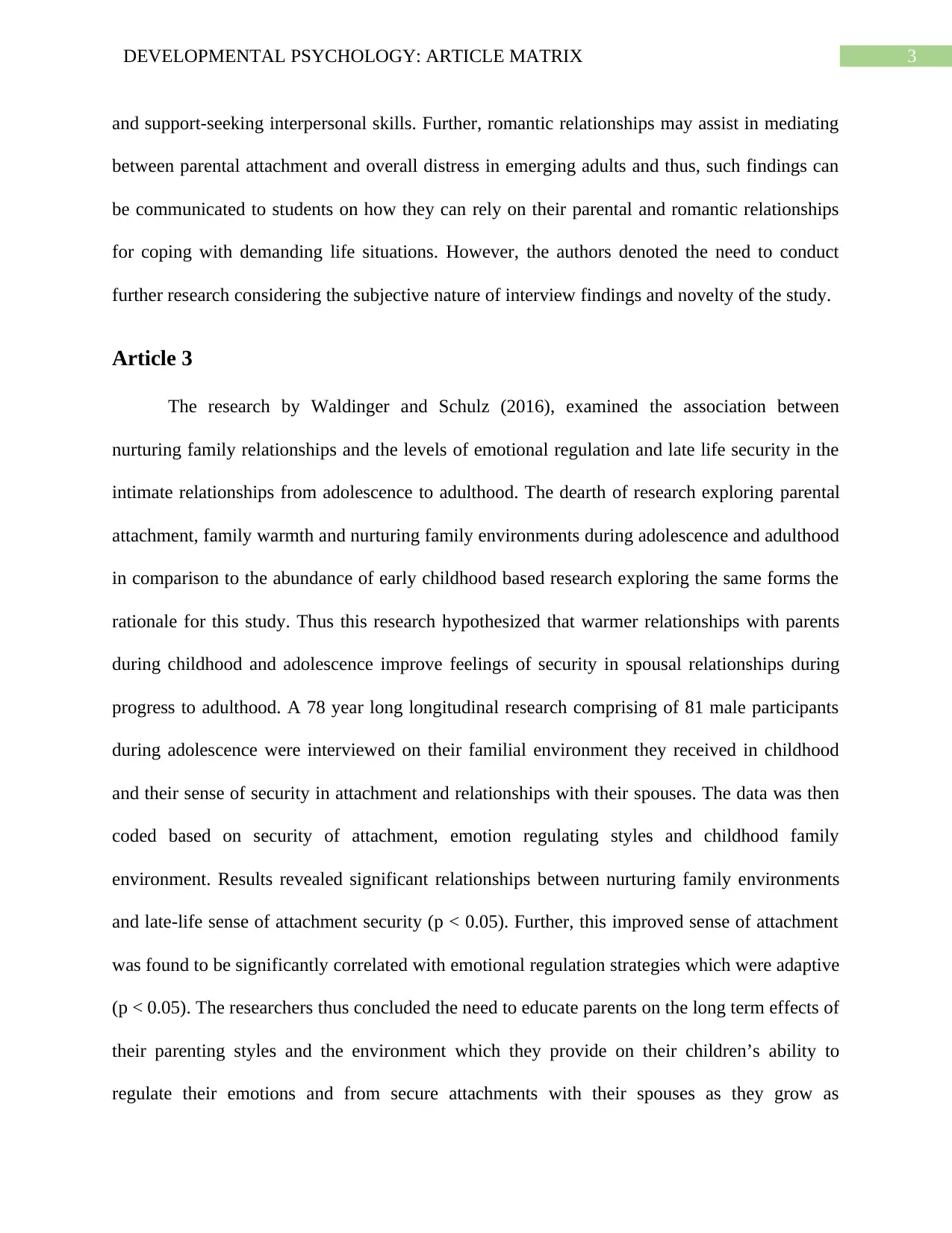
3DEVELOPMENTAL PSYCHOLOGY: ARTICLE MATRIX
and support-seeking interpersonal skills. Further, romantic relationships may assist in mediating
between parental attachment and overall distress in emerging adults and thus, such findings can
be communicated to students on how they can rely on their parental and romantic relationships
for coping with demanding life situations. However, the authors denoted the need to conduct
further research considering the subjective nature of interview findings and novelty of the study.
Article 3
The research by Waldinger and Schulz (2016), examined the association between
nurturing family relationships and the levels of emotional regulation and late life security in the
intimate relationships from adolescence to adulthood. The dearth of research exploring parental
attachment, family warmth and nurturing family environments during adolescence and adulthood
in comparison to the abundance of early childhood based research exploring the same forms the
rationale for this study. Thus this research hypothesized that warmer relationships with parents
during childhood and adolescence improve feelings of security in spousal relationships during
progress to adulthood. A 78 year long longitudinal research comprising of 81 male participants
during adolescence were interviewed on their familial environment they received in childhood
and their sense of security in attachment and relationships with their spouses. The data was then
coded based on security of attachment, emotion regulating styles and childhood family
environment. Results revealed significant relationships between nurturing family environments
and late-life sense of attachment security (p < 0.05). Further, this improved sense of attachment
was found to be significantly correlated with emotional regulation strategies which were adaptive
(p < 0.05). The researchers thus concluded the need to educate parents on the long term effects of
their parenting styles and the environment which they provide on their children’s ability to
regulate their emotions and from secure attachments with their spouses as they grow as
and support-seeking interpersonal skills. Further, romantic relationships may assist in mediating
between parental attachment and overall distress in emerging adults and thus, such findings can
be communicated to students on how they can rely on their parental and romantic relationships
for coping with demanding life situations. However, the authors denoted the need to conduct
further research considering the subjective nature of interview findings and novelty of the study.
Article 3
The research by Waldinger and Schulz (2016), examined the association between
nurturing family relationships and the levels of emotional regulation and late life security in the
intimate relationships from adolescence to adulthood. The dearth of research exploring parental
attachment, family warmth and nurturing family environments during adolescence and adulthood
in comparison to the abundance of early childhood based research exploring the same forms the
rationale for this study. Thus this research hypothesized that warmer relationships with parents
during childhood and adolescence improve feelings of security in spousal relationships during
progress to adulthood. A 78 year long longitudinal research comprising of 81 male participants
during adolescence were interviewed on their familial environment they received in childhood
and their sense of security in attachment and relationships with their spouses. The data was then
coded based on security of attachment, emotion regulating styles and childhood family
environment. Results revealed significant relationships between nurturing family environments
and late-life sense of attachment security (p < 0.05). Further, this improved sense of attachment
was found to be significantly correlated with emotional regulation strategies which were adaptive
(p < 0.05). The researchers thus concluded the need to educate parents on the long term effects of
their parenting styles and the environment which they provide on their children’s ability to
regulate their emotions and from secure attachments with their spouses as they grow as
Paraphrase This Document
Need a fresh take? Get an instant paraphrase of this document with our AI Paraphraser
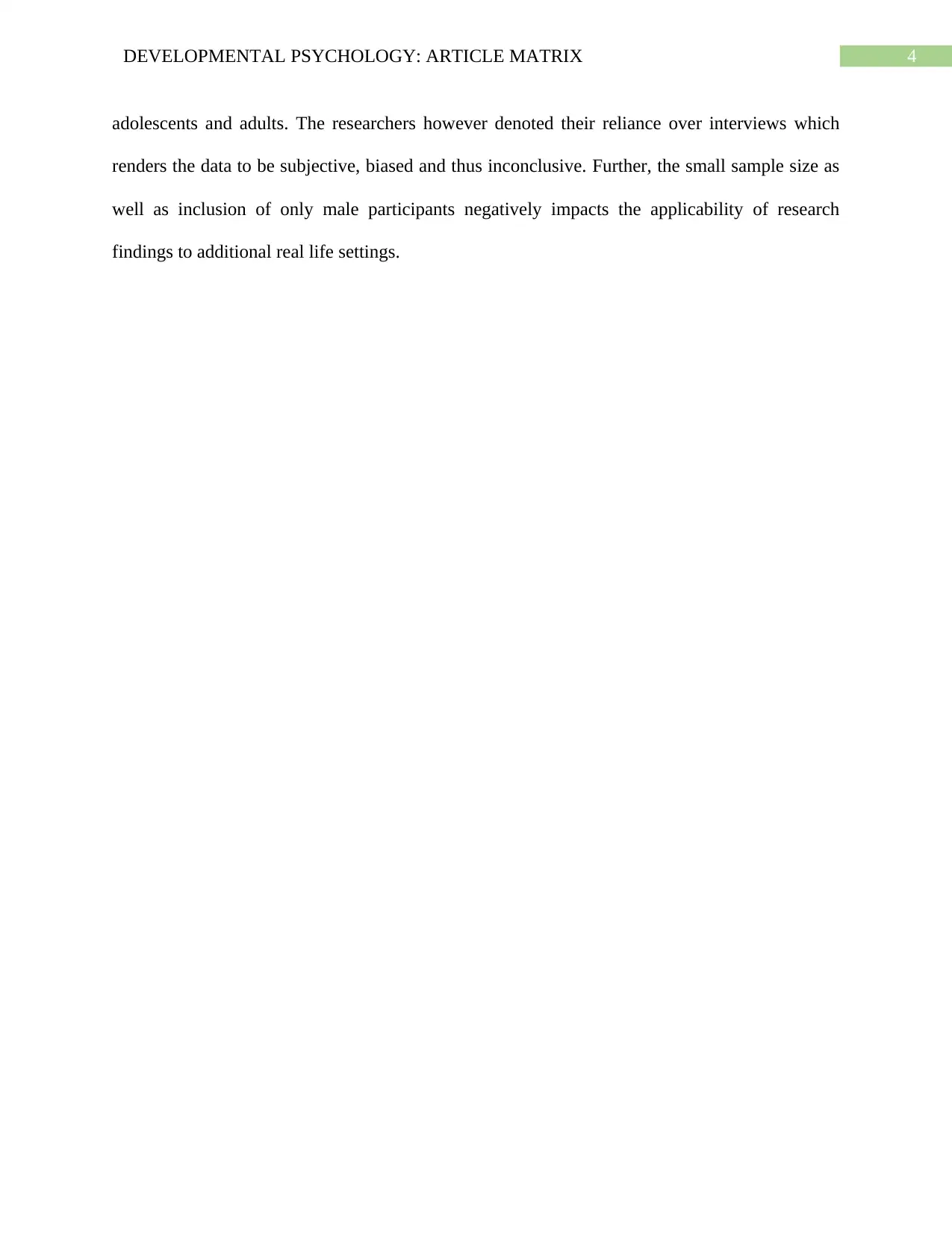
4DEVELOPMENTAL PSYCHOLOGY: ARTICLE MATRIX
adolescents and adults. The researchers however denoted their reliance over interviews which
renders the data to be subjective, biased and thus inconclusive. Further, the small sample size as
well as inclusion of only male participants negatively impacts the applicability of research
findings to additional real life settings.
adolescents and adults. The researchers however denoted their reliance over interviews which
renders the data to be subjective, biased and thus inconclusive. Further, the small sample size as
well as inclusion of only male participants negatively impacts the applicability of research
findings to additional real life settings.
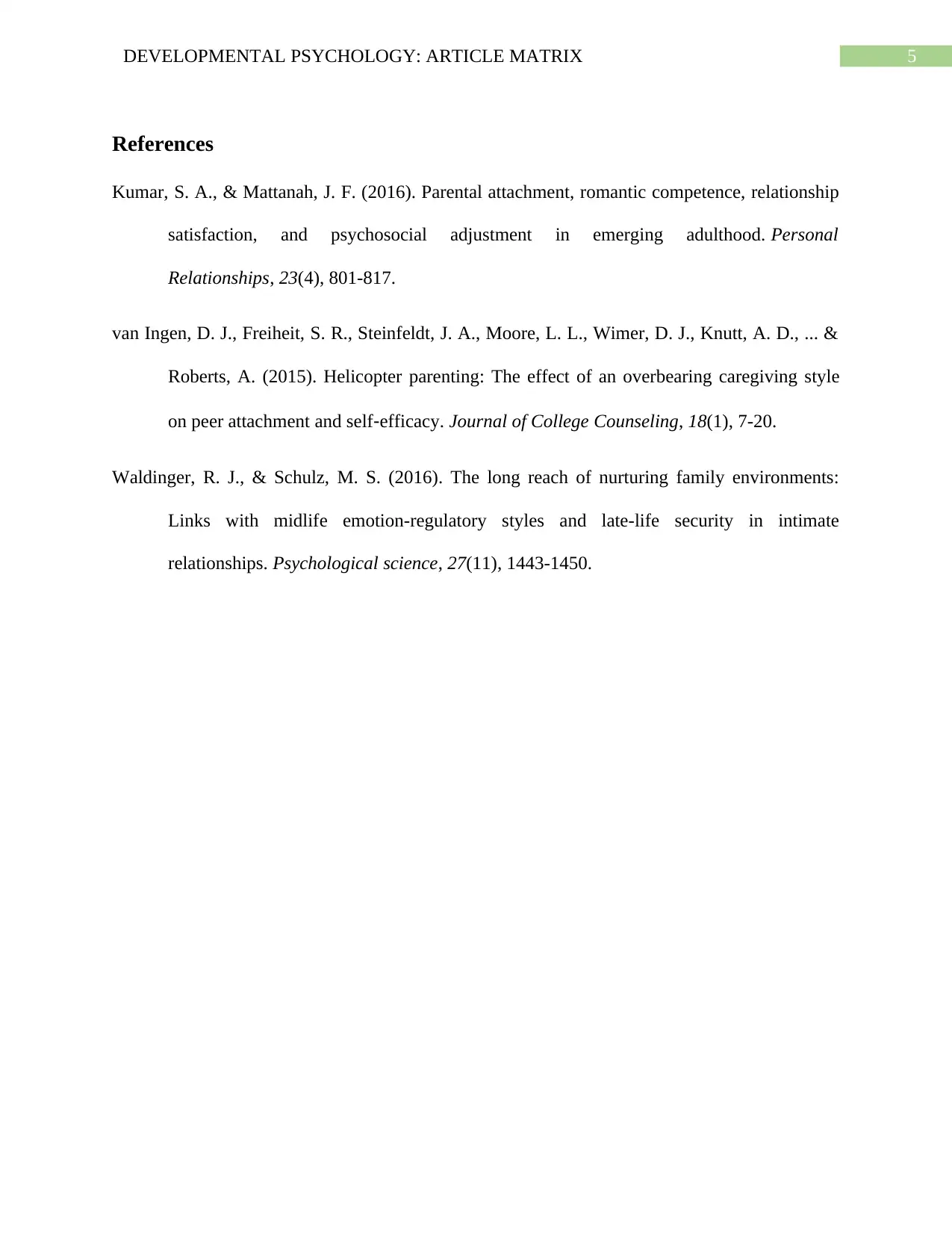
5DEVELOPMENTAL PSYCHOLOGY: ARTICLE MATRIX
References
Kumar, S. A., & Mattanah, J. F. (2016). Parental attachment, romantic competence, relationship
satisfaction, and psychosocial adjustment in emerging adulthood. Personal
Relationships, 23(4), 801-817.
van Ingen, D. J., Freiheit, S. R., Steinfeldt, J. A., Moore, L. L., Wimer, D. J., Knutt, A. D., ... &
Roberts, A. (2015). Helicopter parenting: The effect of an overbearing caregiving style
on peer attachment and self‐efficacy. Journal of College Counseling, 18(1), 7-20.
Waldinger, R. J., & Schulz, M. S. (2016). The long reach of nurturing family environments:
Links with midlife emotion-regulatory styles and late-life security in intimate
relationships. Psychological science, 27(11), 1443-1450.
References
Kumar, S. A., & Mattanah, J. F. (2016). Parental attachment, romantic competence, relationship
satisfaction, and psychosocial adjustment in emerging adulthood. Personal
Relationships, 23(4), 801-817.
van Ingen, D. J., Freiheit, S. R., Steinfeldt, J. A., Moore, L. L., Wimer, D. J., Knutt, A. D., ... &
Roberts, A. (2015). Helicopter parenting: The effect of an overbearing caregiving style
on peer attachment and self‐efficacy. Journal of College Counseling, 18(1), 7-20.
Waldinger, R. J., & Schulz, M. S. (2016). The long reach of nurturing family environments:
Links with midlife emotion-regulatory styles and late-life security in intimate
relationships. Psychological science, 27(11), 1443-1450.
⊘ This is a preview!⊘
Do you want full access?
Subscribe today to unlock all pages.

Trusted by 1+ million students worldwide
1 out of 6
Your All-in-One AI-Powered Toolkit for Academic Success.
+13062052269
info@desklib.com
Available 24*7 on WhatsApp / Email
![[object Object]](/_next/static/media/star-bottom.7253800d.svg)
Unlock your academic potential
Copyright © 2020–2026 A2Z Services. All Rights Reserved. Developed and managed by ZUCOL.

